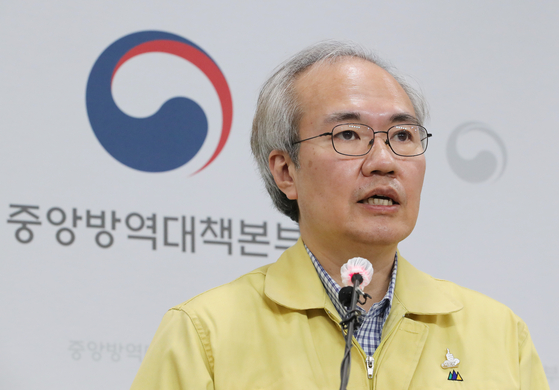
Joon-Wook Kwon, Head of the Central Defense Countermeasure Division. yunhap news
As a result of testing the efficacy of the mutant virus on the antibody treatment’Rekironaju’ developed by Celltrion, the government made recommendations that it should be restricted to those infected with the mutant virus from South Africa. Rekirona was found to be effective in the British paw mutant virus, but was found to be significantly less effective in the South African paw mutant virus.
At a briefing on the 11th, Kwon Jun-wook, head of the 2nd division of the Central Defense Countermeasures Headquarters, said, “As a result of the efficacy evaluation conducted by the National Institute of Infectious Diseases for antibody treatments developed in Korea, 6 types of existing COVID-19 mutant viruses (S, L, V, G, GH, GR) ), it has been confirmed that it has excellent neutralization ability.” Neutralizing ability refers to the ability to neutralize a virus.
Celltrion’s antibody treatment Rekirona received conditional approval for Phase 3 clinical trials from the Ministry of Food and Drug Safety on the 5th.
Deputy General Manager Kwon said, “When looking at the results of the analysis of efficacy at the cellular level for the UK and South African mutant viruses, the UK mutant virus had excellent neutralizing ability similar to the existing mutant strains, but the neutralizing ability for the South African mutant virus was significantly reduced.” Explained. He added, “An additional analysis is underway at the National Institutes of Health (NIH) under the supervision of the development company, and a comprehensive analysis through animal experiments is also planned.”
Deputy Head of Kwon said, “Based on the results, it is recommended to limit the use of the antibody treatment to the confirmed South African mutant virus. However, in the case of confirmed cases of the South African mutant virus epidemic area, we plan to supply antibody therapy upon request by medical staff even before confirmation of the mutant virus infection.” Said.
Deputy Director Kwon said, “At the National Institute of Infections Research under the National Institutes of Health of the National Institutes of Disease Control and Prevention, the concentration of a therapeutic agent that can inhibit virus proliferation by 50% was individually measured by mutation through the flake reduction neutralization test method at the cellular level. As a result, the concentration administered to the human body was measured. When converted into cells, the excellent neutralizing ability, or inhibitory ability, was confirmed in the situation corresponding to the concentration in the six mutant groups S, L, V, G, GR, GH, etc., which are prevalent in Korea including the British mutant. “We have confirmed a clear inhibitory ability.”
He said, “However, in the case of the South African mutant, this neutralization ability has been significantly reduced. In this regard, some papers already published abroad show that the coronavirus dendritic protein called’E484K’ in particular for the South African and Brazilian mutants. “It is a situation that was predicted to some extent because the efficacy of antibody treatments approved for urgent use in the United States was very low when mutations in critical sites occurred.”
Meanwhile, as a result of investigating the efficacy of remdesivir, which is being used as a treatment for COVID-19, against mutant viruses in the UK and South Africa, as a result of investigating the effects of the existing mutant viruses (S, GH, GR), as well as the virus suppression effect on both UK and South African mutant viruses Has confirmed that there is

Samples of the Corona 19 antibody treatment “Rekironaju” are being released at the “New Coronavirus Infectious Disease (Corona 19) Antibody Treatment Production Site Inspection” held at the Celltrion Plant 2 in Yeonsu-gu, Incheon on the afternoon of the 8th. News 1
Deputy General Manager Kwon said, “The National Institute of Infectious Diseases has secured a wide range of antibody substances that are effective against mutant viruses in the UK and South Africa through private cooperation, and is in the process of developing therapeutic agents.” We plan to promote it.”
Reporter Esther [email protected]
